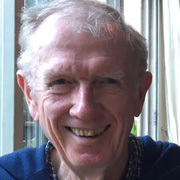
John Knowles
John Knowles has been television manager of three out of four of the former state broadcaster’s stations, and was involved in setting up some major live events in the late 1980s and 1990s. In a career full of highs — and some lows — being Head of Sport at TVNZ was, he says, simply the best job.
Knowles came to television from the world of newspapers. But his interest in the moving image had been piqued early on, by iconic promotional film This Is New Zealand. “That film first sparked my interest in television, and in making films,” Knowles recalls. “I thought ‘jeez, this is good stuff’.”
Raised in Christchurch, Knowles had been a reporter with The Press, then moved to Wellington to work for the NZ Press Association. “But I wanted to go back to Christchurch and thought I’d try the newfangled television,” he says. So he did, initially as a reporter for the NZ Broadcasting Corporation, then from 1975 as Regional Editor for TV One, which saw him producing local news and programme Sunday's World; he was also heading TV One's base in Christchurch.
Knowles was Regional Editor in TV One’s Christchurch newsroom when Flight TE 701 went missing over Antarctica in late November 1979. “We assembled probably about eight o’clock,” Knowles recalls. “We didn’t know really what was going on. At that stage it was an overdue flight ... and then finally about 11 o'clock, 11.30, one of our film editors — John Denton, who was a radio nut — was scanning various amateur radio bands, and he picked up that there had been a sighting on a mountain in Antarctica ... John Denton's radio contact was the first positive lead we had that there was trouble, so therefore by midnight we knew what the story was.”
There was only one media team sent to Scott Base immediately after the disaster — a RNZ talkback host and a TVNZ cameraman. But they were shut out, and sent home after a few days. Knowles was dispatched to the scene and found the same difficulties with Scott Base staff. “It was their grief, it was their patch that was being horribly invaded — so we were not particularly welcome.” By pulling some strings and calling on favours, Knowles managed to get a helicopter flight to the crash site, where he and cameraman Frank Oakeshott were allowed just 20 minutes to get their footage. “It was a chilling experience to be there but, once again, we had a job to do.”
Knowles moved further up the management ladder, as Television Manager at TV One’s Dunedin branch, followed by the same role in Auckland. He then took on a new job as TVNZ's Director of Resources, and was later appointed Head of Sport in time for the lead-up to the 1990 Commonwealth Games in Auckland.
Knowles was in his element. “It was a wonderful time,” he says. “Leading up to the Commonwealth Games in Auckland, I’d been involved as Director of Resources in looking after the host broadcaster side of things anyway, but Whitbread was coming, the Rugby World Cup had just been, the Cricket World Cup was coming along…and the Olympics, as well as all the normal domestic sports coverage. It was a very productive time.”
1990 was also the year of New Zealand's sesquicentennial. With the added responsibility of being Head of Special Events, Knowles commanded the team organising coverage of various events ranging from events on January 1 (from sunrise in Gisborne to celebrations at Bastion Point), to a Kiri Te Kanawa concert in the Auckland Domain, and the Queen at Waitangi. “Everything was full on, ” says Knowles. “It was probably the most intense outside broadcast activity in New Zealand’s history.”
A bitter disagreement with the then recently appointed Head of Television saw Knowles on gardening leave for a period from 1997. He did various jobs including some consulting for the Malaysian and Samoan Governments, and two seasons managing media for New Zealand Cricket.
In late 2000 Knowles set off for Tokyo, to take up the role of Executive Vice President at the J-Sports cable/satellite network. It was something of a home to former TVNZ alumni: ex TVNZ Deputy Director-General Darryl Dorrington, who was now head of J-Sports’ parent company Liberty Japan, and another senior manager, Graeme Wilson.
The cultural changes took some getting used to, especially around the way business was conducted. As an outsider, he had to be very careful how he made suggestions. “My chief modus operandi was to say ‘look, it might be a good idea if we do this’ and then wait a couple of months, and they come back and say ‘we’ve had this idea'…”
Baseball was, and still is, huge in Japan, but its off-season presented Knowles with a problem — keeping subscribers watching. To keep viewers interested, he introduced fillers, such as dancing and get fit programmes. One such filler was cycling. “It became very popular — especially the Tour de France, where the scenery is spectacular. It became one of our major events.” Subscriber numbers grew from three to eight million during his time.
At the beginning of 2009 Knowles returned to New Zealand. But he returned to Japan on a regular basis for three more years, as a consultant to the International Rugby Board, acting as the bridge between them and Japanese authorities for the 2019 Rugby World Cup. Following that Knowles went on to work in the Pacific, particularly with television in Fiji and Samoa — upgrading facilities and expertise, and assisting with international rugby coverage.
Profile written by Doug Coutts
Published on 11 June 2018
Sources include
John Knowles
'John Knowles: From the news room to sports boss...' (Video interview) NZ On Screen website. Director Andrew Whiteside. Loaded 12 June 2018. Accessed 12 June 2018
'John Knowles' (Radio interview) Radio New Zealand website. Loaded 31 December 2008. Accessed 11 June 2018